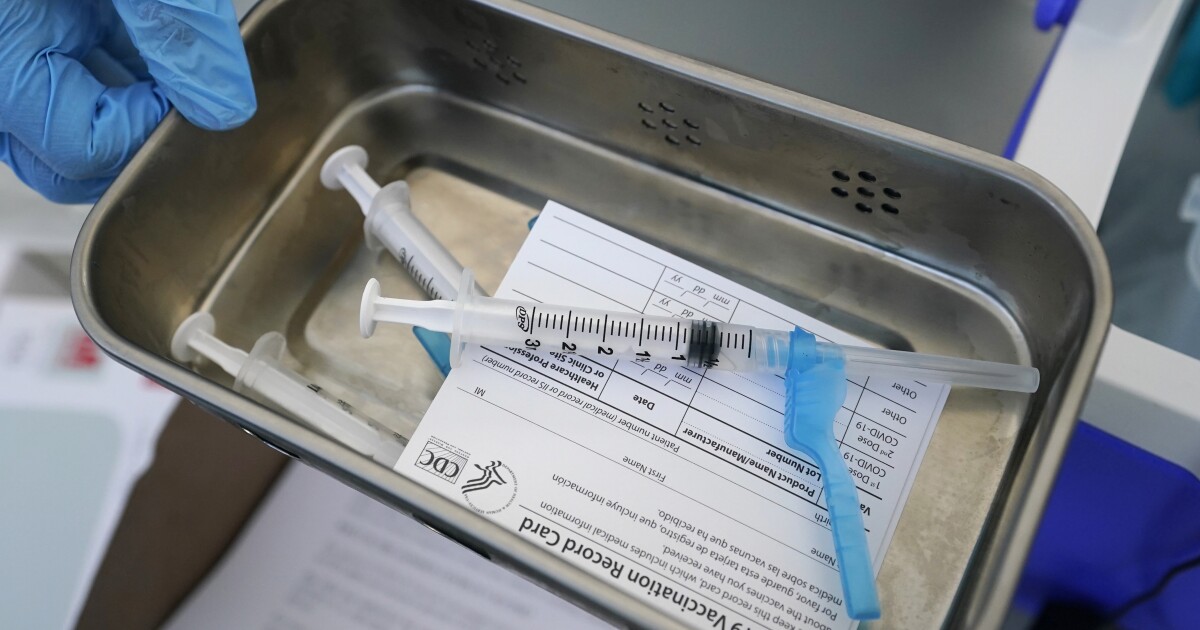Many Americans who were inoculated with Pfizer vaccines are already receiving the booster shots, so millions of people who got the antigen from Moderna or Johnson & Johnson eagerly wait to know when it’s their turn.
Federal regulators will begin to address that issue this week.
On Thursday and Friday, the Food and Drug Administration (FDA) will convene its independent advisory committee for the first stage in the process of deciding whether to apply additional doses of the two vaccines and, if so, who should receive them and when. Final approval is not expected for at least a week.
After FDA advisers give their recommendation, the agency itself will make a decision on the authorization of the booster doses. Then next week, a panel convened by the Centers for Disease Control and Prevention (CDC) will offer more details on who should receive them. Their decision is subject to the approval of the CDC director.
The process is intended to reinforce public confidence in antigens. But it has already sparked conflict between experts and agencies, and documents the FDA released Tuesday suggest that this week’s decisions will be just as difficult.
In a vaccine dispute last month, the CDC advisory panel backed Pfizer’s boosters after six months only for older Americans, nursing home residents and people with underlying health problems. But CDC Director Dr. Rochelle Walensky ignored those recommended limits and decided that boosters should also be offered to those in high-risk jobs, such as teachers and healthcare workers, adding tens of millions more Americans to the pool. ready.
Certain health experts fear that shifting deliberations are hampering the public effort to persuade the uninoculated to get vaccinated for the first time. They worry that the talk about booster doses will lead people to mistakenly doubt the efficacy of antigens in the first place.
When the FDA panel meets to review the Moderna and J&J vaccines, experts will discuss whether a third injection of Moderna should contain only half the original dose, as well as the best time for a second. single dose J&J antigen injection.
The panel will also look at the safety and efficacy of mixing and matching different brands of vaccines, something that US regulators have not endorsed so far.
An estimated 103 million Americans are fully inoculated with Pfizer’s formula, 69 million with Moderna and 15 million with J&J, according to the CDC. Regulators addressed the issue of Pfizer’s boosters first because the company submitted its data before the other manufacturers.
Tim Anderson, a US history teacher at a prep school outside of Louisville, Kentucky, had received the two Moderna injections months before contracting COVID-19 in August. Although his symptoms hit him “like a sledgehammer”, he is convinced that the vaccine saved him and his girlfriend from the most serious effects of the virus.
Both are awaiting authorization for a booster injection from Moderna.
“Until we can build enough immunity in our bodies and, you know, as a group of humans, I’m willing to do whatever I have to do,” explained Anderson, 58.
The FDA meetings come at a time when inoculations in the United States have risen again above 1 million per day, on average, an increase of more than 50% in the last two weeks. The increase has been driven primarily by reinforcements from Pfizer and employer inoculation mandates.
While the FDA and CDC have so far endorsed the Pfizer boosters only for specific groups, officials in the Biden administration, including Dr. Anthony Fauci, have suggested that additional injections will eventually be recommended for most Americans.
In a new review of Moderna’s data, the FDA did not say Tuesday whether it was leaning toward approving the company’s booster dose. He noted that vaccines used in the United States still provide protection and raised questions about some of Moderna’s data.
Moderna’s two initial injections contain 100 micrograms of the antigen each. But the drugmaker maintains that 50 micrograms should be sufficient as a booster for healthy people.
A company study, involving 344 people, gave participants a 50-microgram injection six months after their second dose, and levels of antibodies that fight the virus rose. Moderna explained that the boost caused a 42-fold increase in antibodies capable of attacking the extra-contagious Delta variant.
The side effects were similar to the fevers and aches that Moderna vaccine recipients often experience after their second regular injection, the company said.
As for the people who received the J&J vaccine, the company submitted data to the FDA for different options: a booster shot at two months or at six months. The company added in its filing to the FDA that a six-month booster is recommended, but that a second dose could be given at two months in some situations.
J&J released data in September showing that a booster dose given at two months provided 94% protection against a moderate to severe COVID-19 infection. The company has not disclosed patient data with a six-month booster, but early measurements of the antibodies that fight the virus suggest it provides even greater protection.
Even without a booster, J&J argues, their vaccine remains 80% effective in preventing coronavirus hospitalizations in the United States, for at least several months after it is given.
Scientists emphasize that the three antigens used in the United States still offer strong protection against serious illness and death from COVID-19. The question is how fast and how much protection against less severe infections can decrease.
In a recent study, researchers compared about 14,000 people who had received their first dose of Moderna a year ago with 11,000 vaccinated eight months ago. As the Delta variant increased in July and August, the more recently inoculated group had a 36% lower rate of “breakthrough” infections, compared to those vaccinated longer.
Associated Press reporter Bobby Caina Calvan, who is in New York, contributed to this story.
If you want to read this article in Spanish, Click here.
–


:quality(85)//cloudfront-us-east-1.images.arcpublishing.com/infobae/KAOFCTIUCJYG55DBWWJSHWSEFA.jpg)